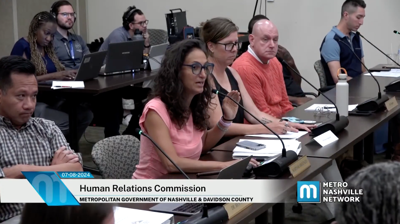The Metro Human Relations Commission on Monday accepted the terms of a conciliated agreement, the next step in resolving a Title VI complaint filed by a group of artists in October.
The agreement contains a “make-whole” financial provision that will fully fund applications for 26 public art projects — most of which are murals — that were left out of the Arts Commission’s funding allocations for fiscal year 2024. The agreement contains no admission of fault by any party, including Metro Legal and the Metro Arts Commission, and the complainants must agree to drop any potential related legal claims against Metro.
Daniel Singh gets $200,000 in deal as commission looks to put the chaos of last year behind it
The artists who filed the Title VI complaint alleged that the Metro Arts Commission violated their civil rights and acted in a discriminatory manner when the commission voted to rescind its vote on a funding formula last summer. A new vote by the commission led to approval of a funding formula that took money away from individual artists and small arts organizations to maintain the prior year’s funding levels for larger arts organizations.
In March, the Human Relations Commission found probable cause that a violation of Title VI had occurred and voted to hold a public hearing in the event that the complaint could not be resolved through further conciliation efforts. The public hearing was not scheduled, so as to allow for additional time for the parties to reach an agreed resolution.
The Human Relations Commission’s fact-finding report, which served as the basis for the commission’s finding of probable cause, concluded that the Arts Commission’s decision to rescind its initial vote was heavily influenced by advice from Metro’s legal department, which opined that the commission had acted unlawfully by discussing the impact of the funding formula on minority communities. Citing a recent Supreme Court decision that struck down affirmative action programs in universities, Metro Legal claimed that the commission’s discussions could open them up to a lawsuit.
Metro legal director Wally Dietz has maintained this position throughout the ensuing months of controversy. Dietz’s refusal to rescind or modify this interpretation became a point of contention on Monday, as complainants and some commissioners voiced their disappointment with the terms of the agreement.
“Metro Legal is holding to this idea that they didn’t do anything wrong,” said complainant Christine Hall.
Human Relations Commissioner Garlinda Burton, the only commissioner to vote against the agreement, was critical of the role Metro Legal played. “I feel in this case Metro Legal … weaponized the interpretation of the law,” said Burton, “to keep their foot on the necks of BIPOC people, LGBTQ people and other marginalized groups.”
Metropolitik: Sitting members of the Community Review Board question Metro Law Department’s aims and conduct in complaint fallout
Commission Chair Maryam Abolfazli — who’s currently running for Tennessee’s 5th Congressional District seat — struck a more optimistic note. “We’re here today saying we want more,” Abolfazli said, “but hell if I thought we could get this.”
Complainant Lydia Yousief says she’s conflicted about signing the agreement. “This whole thing is Legal putting us in a chokehold and telling us our ‘choices’ are either tap out or death,” Yousief tells the Scene. “And I guess I’m choosing to tap out.”
Metro Legal and the Arts Commission — through representatives involved in the conciliation process — have both indicated that they intend to sign the agreement. The Arts Commission will need to vote to approve the agreement’s terms at their next meeting. Legal representatives for the parties will work to draft a final version of the agreement, to be fully executed by July 31.







